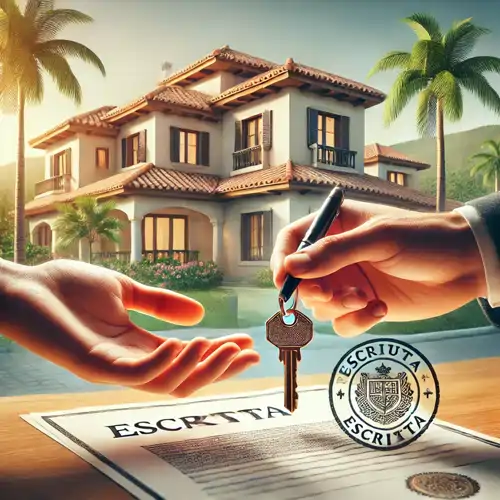Escritura Publica in Spain: Essence and Purpose
When purchasing property in Spain, many buyers encounter the concept of Escritura Publica which is a notarized document that confirms the legality of the sale transaction and serves as a guarantee of ownership. It is important to understand that without executing the Escritura Publica, your transaction will not be recorded in the Property Registry and therefore you risk encountering hidden debts from the previous owner and even losing the property.
The primary concern for buyers here is the fear of becoming entangled in a complex procedure, missing important details, or inadvertently signing unfavorable terms. The solution is to familiarize yourself in advance with the role of the notary, the formalization process, the required documents, and the registration deadlines, and if necessary, to engage a qualified lawyer or translator.
What Does Notarization Provide?
Escritura Publica is a public document that gives legal force to a private sales contract. It is signed in the presence of a notary who verifies:
- The authenticity of the personal data of the parties involved in the transaction (buyer, seller).
- The legality of the prospective transaction (absence of restrictions or encumbrances).
- The conformity of the contract terms with Spanish law.
Without the Escritura Publica it is impossible to make changes in the Property Registry, and therefore home ownership is not considered reliably protected. Notarization also helps to avoid fraud when a dishonest seller might sell the same property to several individuals.
Key Aspects of Executing the Escritura Publica in a Sale
1. Verifying Information and the Roles of the Parties
Before signing the Escritura Publica, the notary requests an extract from the Property Registry. In this way any encumbrances such as a mortgage in Spain or debts of the previous owner are revealed. If the property is under mortgage, the debts must be settled prior to or on the day of closing the transaction (with the buyer's consent it is possible to restructure the loan).
The procedure involves:
- Buyer or their representative.
- Seller or their representative.
- Translator (if any party does not understand Spanish).
- Notary who is responsible for the legality of the transaction.
2. Documents and Identity Verification
The primary document for a foreigner is the NIE (Número de Identificación de Extranjeros) which confirms identity and tax status. The notary also verifies the passport details of the parties and any powers of attorney (if representatives are involved). If a power of attorney is issued outside Spain it must be translated into Spanish by an official translator and apostilled.
3. Contents of the Escritura Publica
The document includes:
- Full details of the seller and buyer: full name, NIE, passport information, and residential address.
- A description of the property: exact address, cadastral number, and features (area, number of rooms, garage, etc.).
- The purchase price, method of payment (bank transfer, check), and payment dates.
- Any encumbrances or debts (if applicable).
- Terms of the mortgage (if applicable).
- The ownership percentage if the property is purchased by multiple co-owners.
4. Copia Simple and the Original Escritura Publica
The original Escritura Publica (that is, the main document with the notary's signatures and seal) is stored in the notary's archive and later transferred to the appropriate repositories. The parties receive a certified copy of the Escritura Publica — Copia Autorizada or a simplified version Copia Simple. The latter is used for most everyday and administrative matters such as connecting utilities.
5. Subsequent Registration in the Property Registry
After the Escritura Publica is signed, the notary sends it to the Property Registry for official registration. This process takes from several weeks to three months. From the moment of registration, the buyer obtains legally protected ownership rights.
Registration in the Registry allows for:
- Protection against claims from creditors of the previous owner.
- Avoidance of double sales of the same property.
- Obtaining a mortgage loan if required.
Additional Aspects: Taxes and Marital Conditions
In addition to the costs of the notary and registration, Spain imposes taxes on the purchase of property (usually a property transfer tax or VAT depending on the type of property). It is also necessary to consider IBI (Impuesto sobre Bienes Inmuebles) which is an annual property tax.
If the purchase is made within a marriage, the spouse automatically acquires an equal share of the ownership. Under other arrangements the ownership shares must be clearly specified in the Escritura Publica.
How to Avoid Risks and Alleviate the Main Concerns of the Buyer
1. Confirm All Expenses in Advance
To avoid unexpected payments, clarify in advance the cost of notarial formalization, registration, taxes, and bank fees. This will prevent financial surprises and protect your budget.
2. Use the Services of Professionals
A qualified lawyer or consultant who is knowledgeable about Spanish law will help review the documents properly, understand the contracts, and prevent errors. If you do not speak Spanish, be sure to engage a licensed translator.
3. Document All Terms in Writing
All agreements regarding price, deadlines, method of payment, and other important details must be stipulated in the Escritura Publica or a preliminary contract. This ensures that no party can unilaterally change the terms.
4. Verify the Property through the Property Registry
Before signing, be sure to request an extract on the status of the property to ensure that there are no debts or liens. This will allow you to be aware of potential risks in advance and negotiate with the seller regarding the settlement of any debts.
Conclusion
Escritura Publica is one of the most important documents when purchasing property in Spain. Proper notarial formalization, registration, and understanding of all expenses help to avoid the main concerns of the buyer: hidden debts, issues with documentation, the risk of losing ownership, and language barriers. Consult with specialists, gather the necessary documents in advance, and thoroughly verify the property. Then executing the Escritura Publica will become not an intimidating legal challenge but a clear step in your successful transaction.








